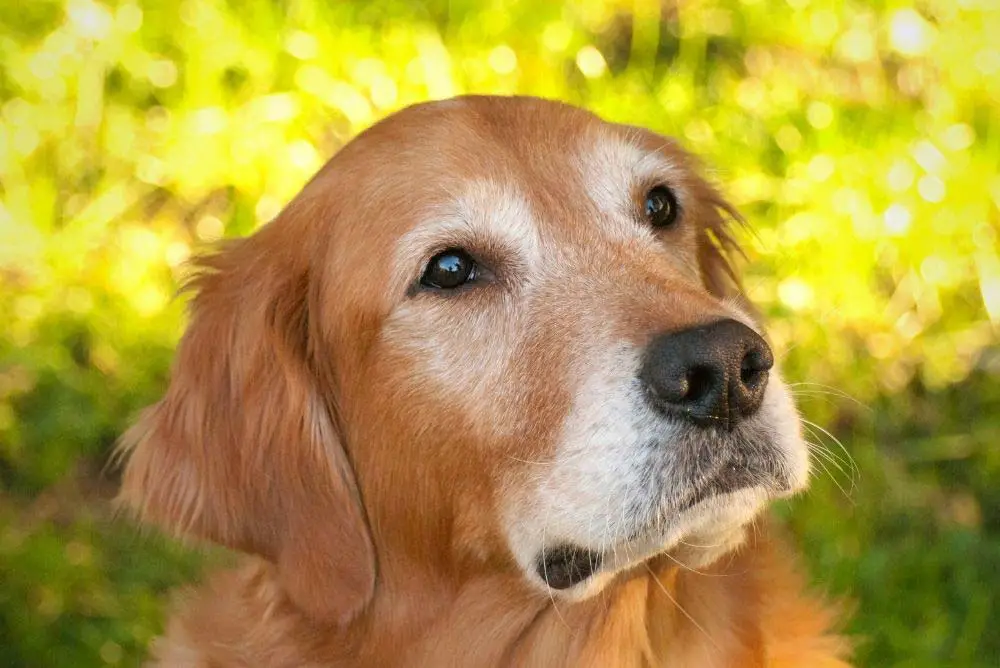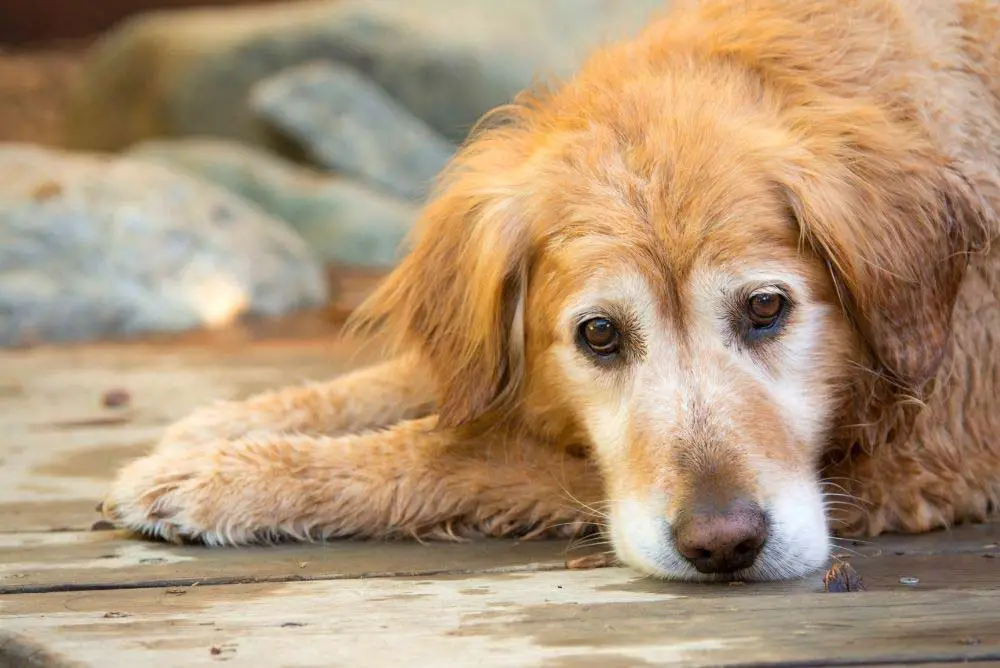Golden retrievers are some of the best dogs in the world! They’re friendly and generally wonderful dogs for all types of people and families. If you have a golden retriever or are thinking of getting one, you may have noticed that over time a goldens face often begins to turn white or gray and wondered why this is and at what age it happens?
A Golden Retriever’s face will begin to turn white or gray starting when he or she is about five years old. Goldens often develop noticeably white muzzles by age six or seven. Though age is the primary cause of a white face, genetics, stress, vitiligo, and general health can also be significant factors.
If you want to learn more about why golden retrievers’ faces turn white, read on. You’ll learn some useful information that can help you understand what’s going on with your Golden.

(This article may contain affiliate links and loyalgoldens may earn a commission if a purchase is made.)
Unlock your goldens natural intelligence and see just how quickly problem behaviors disappear.This is the best at home dog training I've ever used!
Why Do Some Golden Retrievers Have White Faces?
Just as in the case of humans, many factors cause graying in golden retrievers. Just like you, your golden has cells in his body that are called melanocytes. They produce melanin, which is a pigment that gives skin and hair its color.
The melanocytes are sensitive to different types of damage. As a golden retriever ages, the cells will lose their ability to produce pigment. When this happens, this is when hair begins to lose its color and turn white or gray.
However, you’ve probably noticed that most goldens don’t go gray all over their bodies. Typically, the vast majority of the graying you will see on a golden retriever is on his face, mostly around his eyes and on his muzzle.
However, there can be several reasons why a dog’s face would start to turn gray.
Graying in Golden Retrievers Due to Age
This is the most obvious reason. As your dog grows older, his melanin levels will gradually decrease. As this happens, the white hairs will become more numerous and noticeable on your dog. It’s also a good idea to remember that larger dogs typically age more quickly than smaller ones.
Since golden retrievers are one of the larger breeds, it makes sense that they would start to develop white hairs more quickly than a smaller dog. As difficult as it may be to accept, dogs age much faster than humans.
You might have heard the general “rule” that dogs age seven times as quickly as humans do. However, this is not entirely accurate. Generally, for a medium-sized dog, the first year of life is equivalent to about 15 human years. The second-year is equivalent to about nine human years, and after that, each year can be compared to about five human years.
The typical lifespan for a golden retriever is between 10 and 12 years. Usually, they will be considered senior dogs when they’re about eight or nine years of age.
Graying and Golden Retriever Genetics
Golden retrievers are one of the breeds that seem to go gray at a relatively early age. Just like humans, some dogs have inherent genetics that cause them to start going gray earlier than others, even if they’re entirely healthy otherwise.
There are certain breeds of dogs prone to going gray at an early age, such as poodles and bearded collies. This list also includes golden retrievers. Fortunately, no matter how gray or white in the face a golden retriever gets, they still continue to act puppy-like throughout most of their lives!
Stress Can Cause a Golden to Go Gray Sooner
According to a recent study, you may occasionally see premature graying in a golden retriever dog as young as one to four years old, this can have quite a bit to do with stress. Specifically, it’s influenced by impulsivity and anxiety. This corresponds to what many people have observed about humans going gray at younger ages because of stress.
There are certain signs of impulsivity and anxiety in golden retrievers that you can look out for that may be linked with premature graying. Some are as follows:
- Having a hard time calming down
- Jumping up on people
- Having a hard time staying focused
- Constant hyperactivity, even right after exercise
- Fear of people, showing by cringing and hiding
- Fear of different things, such as unfamiliar people, other animals, and loud noises

Generally, golden retrievers (or any breed of dog for that matter) that have experienced a history of abuse and neglect tend to be more anxious and impulsive than others. This is one potential reason for premature graying that can be controlled somewhat.
A calming environment in the household is good for dogs just as it’s good for humans. Also, there’s a difference between a dog being excited and totally out of control. You can teach your dog to be calmer and more in control of their emotions through good training.
Vitiligo and Golden Retrievers
In some rare cases, a golden retriever’s fur will turn white because of vitiligo. This is a skin condition that can lead to pigment loss in patches of hair and skin. It’s believed that this condition is passed down through genetics, even though the specific causes are not known. However, it’s also fairly clear that this condition is linked to the cells in your dog’s body that produce melanin.
Not every case of vitiligo is going to manifest itself in the same way in a dog. Sometimes, a dog will lose pigmentation all over the body, while in other cases, there will only be a few affected areas. Affected areas can expand as well in the first few months that your dog has the condition. Additionally, it can lead to dandruff and skin lesions.
The good thing is that this condition does not cause any pain for your dog. It’s rare, and golden retrievers are not one of the most likely breeds to be affected by it. However, you should know that it tends to be more commonplace in purebred dogs because it’s hereditary.
Health and Premature Graying in Golden Retrievers
The general health of a golden can also be a factor that contributes to premature graying. Typically, this goes hand-in-hand with age.
As your golden retriever gets older, he will likely undergo changes in his health, which are normal. He might experience arthritis, more fatigue, less of an appetite, cloudy eyes, or thinning of his hair, for example. However, if you observe premature graying, it could indicate some sort of underlying health issue that you need to address.
If you see that your golden is going gray at an age that seems unexpectedly early, you should be very vigilant about observing your dog. Ensure that he is eating normally, engaging in activities, and being aware of any noticeable changes in his alertness or disposition. If anything seems off, you should contact your veterinarian immediately.
A few conditions can lead to premature aging, which includes premature graying in a dog. If they have any of the following:
- Cushing’s disease
- Hypothyroidism
- Kidney function issues
- Liver function issues
Premature graying in a golden retriever itself may not be a major concern. However, if you see a premature graying and some other change in your dog, it could be a real cause for concern that you need to address right away.
Discover how to train your Golden Retriever by playing games: 21 games to play with your Golden that will make them smarter and better behaved!
What Age Do Golden Retrievers Faces Turn White?
Pretty much without exception, all golden retrievers faces will turn white as they age. Generally speaking, a golden retriever will start to grow their first gray hairs when they are about five years old. However, it can also happen earlier or later. Golden retrievers are one breed that tends to show their age first in this regard.
Golden retrievers can vary considerably in coat color. Some are deep red, some are a light beige, and most are in the middle with a golden color. The white or gray hairs will be more obvious at first in a darker colored golden, while in a cream or light colored golden retriever might not become noticeable for quite some time. In general, most goldens will have visibly white muzzles by the time they are six or seven years old.
Conclusion
You might wonder why your golden retriever’s face has started to turn white or gray? Most of the time, the phenomenon is pretty similar to what happens in humans. It’s a result of age, although other factors can play a part.
In some cases, Golden retrievers will start turning gray before they’re even considered to be senior dogs. So you don’t need to take the graying muzzle as some harbinger of doom unless he’s displaying other signs of discomfort or pain.
Beginning to turn gray is just a part of life for a golden retriever. And while it might be a sign of age, know that your golden will probably continue to act young and puppy-like for many years to come!
More Golden Retriever Articles You’ll Love!
- How Much To Feed a Golden Retriever Daily (Puppy, Adult, Senior)
- Do All Golden Retrievers Like Water? (The Surprising Answer!)
- When Is a Golden Retriever Too Old to Breed? (The Facts!)
- Running With Your Golden Retriever (What You Need to Know!)
